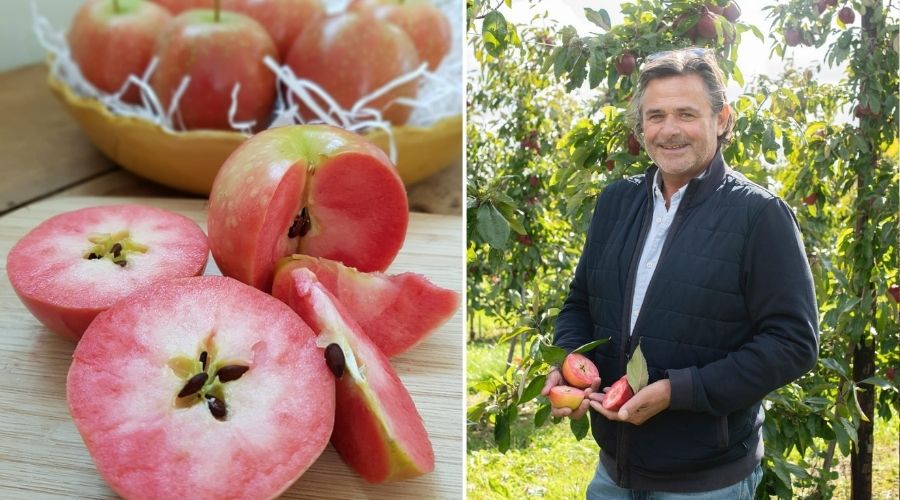From red flesh to Peach Schnapps: What’s new in apples?
11th August 2025
We spoke to Jeremy Linsell of Worldwide Fruit Ltd about some of the most exciting new apple varieties on the horizon.

Despite a number of exciting new apple selections in the pipeline, Jeremy notes that Jazz® remains one of the best apples on the high street. “It really does take some beating. We often benchmark potential new selections against Jazz, and quite often Jazz is still coming out as the top apple in terms of its consistency and eating quality.”
Nonetheless, there’s no shortage of new developments, which he says is important to ensure apples keep pace with other fruit sectors, he adds. “Our competitors aren’t just apples, our competitors are other fruits. We’ve seen innovation coming in so many other fruit forms – there’s a lot more blueberries on the supermarket shelves, you’ve got yellow kiwis, red kiwis, candyfloss-flavoured grapes.”
Some of the most exciting selections include…
Kissabel®: This is an overarching brand for a selection of red flesh apples. It’s been hugely successful, and also has a role in getting children to eat apples. Worldwide Fruit is one of the partners in Ifored, a group of partners around the world, which has been breeding specifically for apples with a red flesh for the past 14 years.
“Globally, we now have six selections with red skin and red flesh, and three with yellow skin and red flesh, but we’re continuing to evaluate other selections and there will be more coming forward,” Jeremy explains. “That kind of model where a breeding programme will sell more than one variety under one brand is becoming relatively common.”
Ladina®: Worldwide Fruit also commercialised Ladina, a variety grown exclusively for Marks & Spencer and sold under the brand name Scarlett Paradise. “It’s a unique, really sweet juicy apple that tastes like Peach Schnapps – it’s just fantastic,” Jeremy says.
Tutti®: This year is also the first commercial harvest of Tutti from the Hot Climate Partnership in Spain. It’s been planted with three different growers in the UK and will be the first apple variety bred specifically for climate challenges to be delivered to the UK market.
Pink Lady®: “Pink Lady’s obviously been around for a long time, but it’s very exciting that we’ve now got a licence to grow it in the UK. Most of the plantations are relatively young, so our production is climbing, but quite quickly now,” Jeremy notes.
Cosmic Crisp®: This was originally bred in America at Washington State University. “We started testing it some years ago and we’re now about to start our first commercial plantings in the UK. In excess of 20 million trees have been planted in North America, which, to my knowledge, is one of the single largest plantings of a new apple.”
Explaining the variety name, Jeremy says: “The skin is quite dark red and the lenticels, the spots on the apples, almost look like stars against the sky, hence cosmic – and, no surprise, it’s a crisp apple.”
It also stores very well – up to 14 months in America – which is very important for giving consumers a consistent eating experience. The trialling stage is only just complete in America but it’s hoped this could be replicated in the UK.
Disease resistance
Disease resistance is also top of the list for breeding programmes, with Worldwide Fruit involved with half a dozen key breeding programmes in North America, New Zealand, and Spain, as well as Europe and even the UK, though the details of the UK programme is currently under wraps. The aim is to find varieties with resistance to pests or disease, or both – but which still deliver on eating quality.
When it comes to commercialising new selections, Jeremy emphasises the importance of rigorous testing. “It’s important that we identify the particular nuances or the challenges of any particular variety so when we move into the third stage, which is commercially growing them, we can give the technical support to our growers.”
Future apples
Commenting on what the apples of the future might look like, Jeremy stresses the importance of brands. “Once people have a good experience with a brand they’ll identify with it and that’s what they’ll buy. So it’s really important that you hang that name or that brand around that experience.”
He also believes that gene editing will eventually become the norm to speed up the apple breeding process, but the concept is not yet widely acceptable to the consumer. For now, he concludes: “We’ve got a rich pipeline of some really fantastic apples coming that have been bred traditionally.”
About our expert
Jeremy Linsell studied agricultural engineering and won a scholarship to study at the Flock House Institute in New Zealand. Back in the UK he became a manager of a top fruit farm, before risking it all to buy the farm in 2001. Realising the future lay in varietal innovation, he invested heavily in new varieties and took on a part-time role heading up Worldwide Fruit Ltd’s variety pipeline strategy. He also represents the industry in global roles such as the Hot Climate Partnership in Catalonia, and is a director of Ifored.
Read more fruit news.
